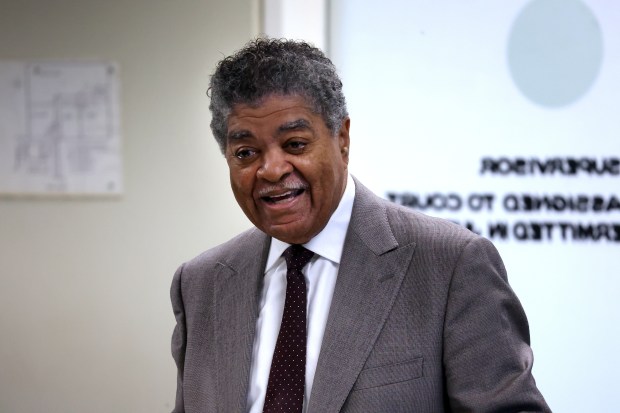After his arrest for retail theft in Lansing in May 2022, Elijah Bell assumed his next stop, and in some ways preferred place, was jail.
He was offered a chance to try a special program offered in Cook County courts meant to divert those charged with low-level, nonviolent offenses from prison. The new option was unfamiliar, and “I didn’t even want to take the opportunity to give it a chance,” he said.
“It was never an option before, it was always jail,” Bell, 55, said of his previous arrests. “Jail was easy for me.”
Cook County Circuit Court’s Problem-Solving Courts divert some cases from the traditional judicial process in areas such as drug, mental health and veterans’ treatment.
County judges can, at their discretion, recommend someone for the program, which directs them to probation off the bat and avoids prison time.
There are 20 such courts, also known as specialty or therapeutic courts, with the goal of preventing high-risk, high-need individuals with underlying mental health and substance abuse issues from becoming repeat offenders, according to the courts.
Bell is one of five people who took part in a graduation ceremony Tuesday at the Markham courthouse after completing the program.
“I didn’t think I would be able to make it halfway through,” he said at the event.
Cook County Circuit Court Chief Judge Timothy Evans said all graduates of the specialty courts are asked to be ambassadors, to tell others facing troubles and “let them know there is life after their problems.”
“Help people to get a new lease on life,” the chief judge urged graduates. “They will get a chance to put their problems behind them.”
“We don’t want to throw our people away,” Evans said. “We want to give them a second chance.”
Judge Daniel Maloney, who oversees the Problem-Solving Courts at the Markham courthouse, said graduates have “overcome unique challenges” and “have accepted the challenge to improve themselves.”
Tommy Brewer, presiding judge at the Markham courthouse, said he knows getting through the program was no easy feat.
“You’ve done something that a year ago you probably couldn’t imagine yourself sitting here today,” Brewer said.
During the graduation ceremony, after receiving his certificate, Bell said he is “greatful the courts recognize the severity of the need for mental health help.”
Bell said when he was younger he “chose prison over trying to get my life right.” This time would be different.
“No matter what, I wasn’t going backwards,” Bell said of entering the diversion program. “I was taking my life back at all costs.”
Edgar Chavez, who had been in the diversion program almost three years, also spoke briefly at the graduation.
“It wasn’t my childhood dream to become an addict,” he told a crowd that mainly included judges, state’s attorney’s office employees and others that work in tandem with the courts in the diversion courts. “I’m grateful. Thank you guys for saving my life.”
Sergio Estrada enrolled in the diversion program in January 2023 and said he had been “heading down a bad path.”
He said that was the first time he had gotten in serious trouble involving the courts, “and it will be the last time.”
Maloney also informed graduates that earlier in the day Tuesday, the state’s attorney’s office had dismissed all charges against them and their probation had ended.
The judge said the next step would be working toward expungement of their records.
A team that is part of the Legal Studies Department at South Suburban College in South Holland has begun fulfilling the statutory requirements, which kicked in after Tuesday’s ceremony, to begin the expungement process, according to the chief judge’s office.
After the graduation, Bell said he had been struggling for years with drug addiction and depression.
“I was addicted to drugs as long as I can remember,” he said. “In a lot of ways I fell in love with that life. I fell deeper and deeper into it.”
The oldest of six children growing up in Chicago’s Garfield Park community, Bell said his immediate family and extended family, including aunts and uncles, tried to help him break the cycle.
Bell said he never had a gun and didn’t commit any violent crimes, but would take part in breaking into trucks where merchandise such as cigarettes, liquor or meat was stored.
“Every time I would get out of jail I would tell myself I wouldn’t get high,” Bell said. “But I did, and I couldn’t understand why I continued to allow myself to be a person I hated.”
Bell said at one point he contemplated suicide.
“I didn’t want to feel that pain and depression,” he said.
Following his retail theft arrest, Bell was referred to the Markham Mental Health court.
A clinical assessment diagnosed Bell with bipolar disorder, and he agreed to go through therapy and treatment, including treatment for drug use.
“A change happened to me,” Bell said. “I went to drug meetings and saw a therapist.”
He now lives at LifeHouse Group in Blue Island, a residential recovery home for adult men with substance use disorders, offering education, addiction counseling, job training and medical care.
Bell said he hopes to become a recovery coach and use his experience to help others.
Speaking after the graduation ceremony, Evans said the court system’s goal is to expand Problem-Solving Courts to take in misdemeanor offenses.
“I want to multiply this,” he said.





